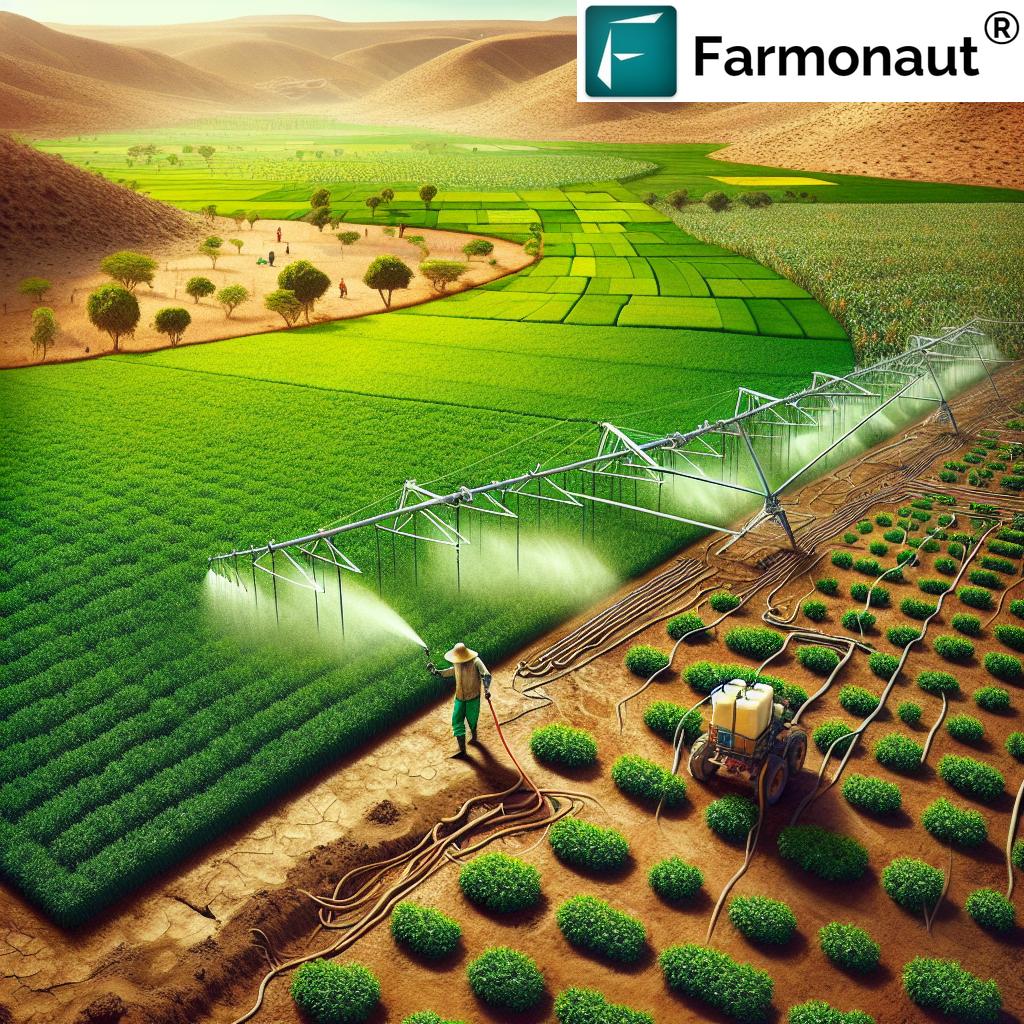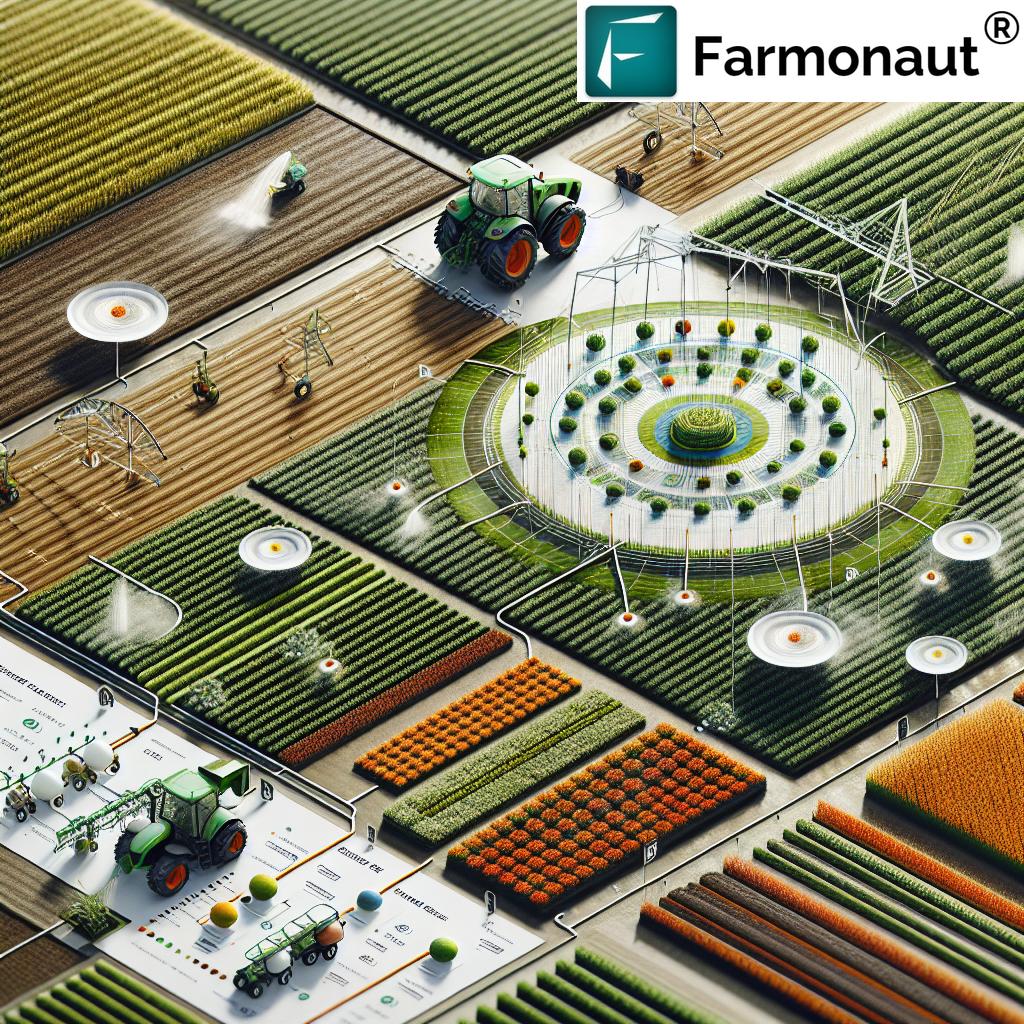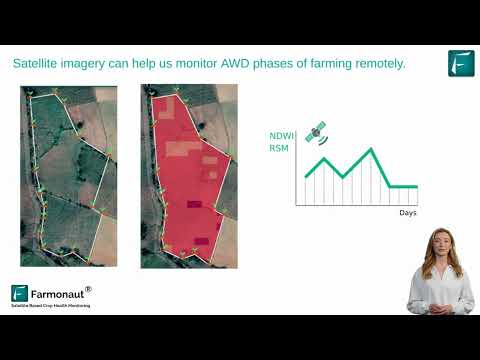Revolutionizing Agriculture in FCT: Farmonaut’s Guide to Sustainable Dry Season Farming and Irrigation Techniques

“Dry season farming techniques can increase crop production by up to 300% compared to traditional rainfed agriculture.”
Welcome to our comprehensive guide on revolutionizing agriculture in the Federal Capital Territory (FCT) through sustainable dry season farming and innovative irrigation techniques. At Farmonaut, we’re excited to share our expertise in precision agriculture and how it’s transforming the agricultural landscape in Nigeria and beyond.
In this blog post, we’ll explore the groundbreaking initiatives that are boosting agricultural productivity through the expansion of irrigation farming. We’ll delve into how the strategic implementation of agricultural inputs for irrigation is turning rainfed farming into a sustainable, year-round endeavor. Join us as we uncover the critical role of NPK and urea fertilizer use in enhancing soil fertility and crop yields, and how these advancements are reshaping rural development in agriculture.
The Shift towards Sustainable Dry Season Farming
The FCT Executive Council has recently taken a significant step towards improving agricultural practices and food security in the region. This bold move involves the approval of a contract for the procurement of essential agricultural inputs, including:
- 250 metric tonnes of NPK fertilizer
- 300 metric tonnes of urea
- 310 knapsack sprayers
- 3,500 litres of liquid fertilizer
This initiative marks the first time the FCT administration has invested in promoting dry season farming, specifically designed to support irrigation farmers with vital resources. The primary objective is to encourage a shift from traditional rainfed agriculture to year-round farming practices through irrigation.
The Importance of Year-Round Crop Production
As the rainy season concludes, the encouragement for dry season farming becomes crucial. This transition enables local farmers to maintain continuous agricultural production, addressing the food needs of the growing population within the territory. By equipping farmers with the necessary inputs and promoting irrigation practices, this initiative is not only expected to bolster year-round farming but also strengthen the agricultural sector within the Federal Capital Territory.
Farmonaut’s Role in Revolutionizing Agriculture
At Farmonaut, we’re proud to be at the forefront of this agricultural revolution. Our advanced satellite-based farm management solutions are designed to make precision agriculture affordable and accessible to farmers worldwide. Here’s how our technology supports sustainable dry season farming:
- Real-time Crop Health Monitoring: Our satellite imagery provides farmers with invaluable insights into vegetation health, soil moisture levels, and other critical metrics.
- AI-driven Advisory System: Our Jeevn AI delivers personalized farm advice, weather forecasts, and expert crop management strategies in real-time.
- Resource Management Tools: We offer solutions for efficient fleet and resource management, helping agribusinesses optimize their operations.
To explore these features and more, check out our web app or download our mobile apps:
Sustainable Agriculture Practices for Dry Season Farming
Implementing sustainable agriculture practices is crucial for successful dry season farming. Here are some key techniques that we at Farmonaut recommend:
- Efficient Irrigation Systems: Drip irrigation and sprinkler systems can significantly reduce water waste while ensuring crops receive adequate moisture.
- Crop Selection: Choose drought-resistant varieties that are well-suited to the dry season climate.
- Soil Management: Implement mulching and cover cropping to retain soil moisture and improve soil health.
- Precision Fertilizer Application: Use our satellite data to determine the optimal timing and amount of fertilizer application, reducing waste and maximizing efficiency.

The Role of NPK and Urea Fertilizers in Dry Season Farming
“Strategic use of NPK and urea fertilizers can boost soil fertility and crop yields by 40-60% in irrigation farming.”
The strategic use of NPK (Nitrogen, Phosphorus, and Potassium) and urea fertilizers plays a crucial role in enhancing soil fertility and crop yields during the dry season. Here’s how these fertilizers contribute to sustainable agriculture:
- NPK Fertilizer: Provides a balanced nutrient mix essential for plant growth, root development, and overall crop health.
- Urea Fertilizer: Offers a high concentration of nitrogen, crucial for leaf growth and chlorophyll production.
At Farmonaut, our satellite technology can help farmers determine the optimal application times and quantities for these fertilizers, ensuring maximum efficiency and minimal environmental impact.
Comparing Traditional and Sustainable Dry Season Farming Techniques
To better understand the benefits of sustainable dry season farming, let’s compare it with traditional rainfed farming methods:
| Farming Aspect | Traditional Rainfed Farming | Sustainable Dry Season Farming | Benefits of Sustainable Approach |
|---|---|---|---|
| Water Management | Dependent on rainfall | Efficient irrigation systems | Year-round water availability, reduced waste |
| Fertilizer Application | Often imprecise and wasteful | Precision application of NPK and urea | Improved soil fertility, higher yields, less environmental impact |
| Crop Diversity | Limited to rain-dependent crops | Wide variety of crops possible | Increased food security, better market opportunities |
| Annual Production Cycles | Single growing season | Multiple growing seasons | Increased annual yield, consistent food supply |
| Resource Efficiency | Often inefficient due to lack of data | Data-driven decision making | Optimal use of resources, reduced costs |
| Environmental Impact | Can lead to soil degradation | Promotes soil conservation | Sustainable land use, reduced environmental footprint |
| Food Security Contribution | Vulnerable to climate variations | Reliable year-round production | Enhanced food security, stable food prices |
Innovations in Irrigation Systems for Dry Season Farming
Advancements in irrigation technology are playing a crucial role in the success of dry season farming. Here are some innovative irrigation systems that are transforming agricultural practices:
- Drip Irrigation: This system delivers water directly to the plant roots, minimizing evaporation and ensuring efficient water use.
- Smart Sprinklers: These systems use weather data and soil moisture sensors to optimize watering schedules.
- Subsurface Drip Irrigation: By delivering water below the soil surface, this method reduces evaporation even further.
- Solar-powered Irrigation: This eco-friendly option reduces reliance on fossil fuels and can be used in remote areas.
At Farmonaut, our satellite data can help farmers determine the most suitable irrigation system for their specific needs, considering factors such as crop type, soil conditions, and local climate.
Food Security Initiatives and Rural Development
The transition to sustainable dry season farming is not just about increasing crop yields; it’s also a crucial component of broader food security initiatives and rural development efforts. Here’s how these agricultural advancements are making a difference:
- Consistent Food Production: Year-round farming ensures a stable food supply, reducing dependence on imports and stabilizing food prices.
- Income Stability for Farmers: Multiple growing seasons provide more consistent income opportunities for rural communities.
- Job Creation: The expansion of irrigation farming creates new employment opportunities in rural areas.
- Technology Adoption: The introduction of modern farming techniques encourages technological literacy among rural populations.
Farmonaut’s technology supports these initiatives by providing farmers with the tools they need to make data-driven decisions, improving both productivity and sustainability.
The Future of Sustainable Agriculture with Farmonaut
As we look to the future of agriculture in the FCT and beyond, Farmonaut is committed to driving innovation and sustainability. Our cutting-edge technology supports the following advancements:
- Precision Agriculture: Our satellite imagery and AI-driven insights allow for precise resource management, reducing waste and improving yields.
- Climate-Smart Farming: We provide tools to help farmers adapt to changing climate conditions and minimize their environmental impact.
- Data-Driven Decision Making: Our platform empowers farmers with real-time data and analytics to optimize their farming practices.
For developers interested in integrating our technology into their own agricultural solutions, check out our API and API Developer Docs.
Conclusion: Embracing Sustainable Dry Season Farming for a Resilient Future
The shift towards sustainable dry season farming techniques in the FCT represents a significant step forward in agricultural development and food security. By embracing innovative irrigation methods, strategic use of fertilizers, and cutting-edge technology like Farmonaut’s satellite-based solutions, we can create a more resilient and productive agricultural sector.
As we continue to face challenges such as climate change and population growth, the importance of sustainable, year-round farming practices cannot be overstated. We at Farmonaut are proud to be part of this agricultural revolution, providing farmers with the tools and insights they need to succeed in the modern world of agriculture.
Together, we can build a future where food security is assured, rural communities thrive, and agriculture works in harmony with our environment. Let’s embrace these sustainable dry season farming techniques and irrigation innovations to create a brighter, more sustainable future for agriculture in the FCT and beyond.
FAQ Section
Q: What is dry season farming?
A: Dry season farming is the practice of growing crops during the dry season using irrigation techniques, allowing for year-round agricultural production.
Q: How does Farmonaut support dry season farming?
A: Farmonaut provides satellite-based farm management solutions that offer real-time crop health monitoring, AI-driven advisory systems, and resource management tools to optimize farming practices.
Q: Why is NPK and urea fertilizer important for dry season farming?
A: NPK provides a balanced nutrient mix essential for plant growth, while urea offers a high concentration of nitrogen. Both are crucial for enhancing soil fertility and crop yields during the dry season.
Q: How can farmers access Farmonaut’s technology?
A: Farmers can access Farmonaut’s technology through our web app, Android app, or iOS app. We also offer API access for developers looking to integrate our solutions into their own systems.
Q: What are the main benefits of transitioning to sustainable dry season farming?
A: The main benefits include increased crop yields, year-round food production, improved resource efficiency, enhanced food security, and more stable income for farmers.





